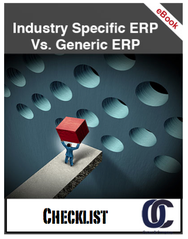The base – that is, out of the box – version of QuickBooks is for financial/accounting only – you have to purchase industry specific versions for manufacturing, wholesale, professional service firms, contractors, non-profit entities, and retailers. QuickBooks is best for very small companies, supporting only 1-5 active users with their general accounting needs.
 Sage ERP X3, on the other hand, supports all those things right out of the box – it covers discrete, process, and mixed mode manufacturing, advanced financials, wholesale distribution, contractors, etc. – all without purchasing additional software. Its functionality extends from accounting to inventory control, material resource planning, shop floor control, supply chain management, and even human resources. It is also more flexible in terms of size capabilities: it is best suited for 50-1,500 employees, all of whom can be working in the system concurrently.
Sage ERP X3, on the other hand, supports all those things right out of the box – it covers discrete, process, and mixed mode manufacturing, advanced financials, wholesale distribution, contractors, etc. – all without purchasing additional software. Its functionality extends from accounting to inventory control, material resource planning, shop floor control, supply chain management, and even human resources. It is also more flexible in terms of size capabilities: it is best suited for 50-1,500 employees, all of whom can be working in the system concurrently.
QuickBooks does not offer full integration of a company’s processes. It is strictly a financial application, whereas Sage ERP X3 is widely considered to be most comprehensive, flexible, and powerful enterprise resource planning system currently in the market – it captures all of a company’s data in a single database, which means that the company’s financial information is automatically incorporated into all departments of the company, lessening the need for double entries and reducing the possibilities of errors in doing so.
Both systems work on the Microsoft Windows platform, and Sage ERP X3 can both import from and export to all Microsoft Office products. QuickBooks, however, does not offer contact synchronization with Microsoft Outlook and doesn’t support Microsoft Office 365; other Office compatibilities do exist, but none work with Office 2013.
And while both softwares offer mobile abilities, QuickBooks charges an extra $9.95 per month for the privilege of working from anywhere – but only with QuickBooks Pro, Premier, Enterprise Solutions.
So while QuickBooks is less expensive than Sage ERP X3, it is only because it lacks so many of the features offered by Sage’s enterprise resource planning system. Getting QuickBooks, therefore, will be cheaper and will, yes, give you a good handle on your financial department, but what about everything else your business does? Sage ERP X3 will cover your financials and all the other tasks you do to run your business. Why choose a less comprehensive system that manages less just to save a little money?



